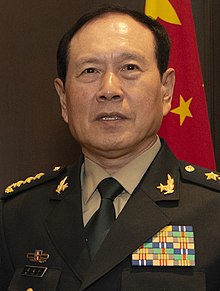Wei Fenghe
 From Wikipedia the free encyclopedia
From Wikipedia the free encyclopedia
Wei Fenghe | |
|---|---|
魏凤和 | |
 | |
| State Councilor of the People’s Republic of China | |
| In office 19 March 2018 – 11 March 2023 | |
| Premier | Li Keqiang |
| Preceded by | Chang Wanquan |
| Succeeded by | Li Shangfu |
| 12th Minister of National Defence | |
| In office 19 March 2018 – 12 March 2023 | |
| Premier | Li Keqiang |
| CMC Chairman | Xi Jinping |
| Preceded by | Chang Wanquan |
| Succeeded by | Li Shangfu |
| Commander of the PLA Rocket Force | |
| In office October 2012 – September 2017 | |
| Preceded by | General Jing Zhiyuan (as Commander of the Second Artillery Corps) |
| Succeeded by | Lieutenant General Zhou Yaning |
| Personal details | |
| Born | February 1954 (age 70) Liaocheng, Shandong, China |
| Political party | Chinese Communist Party (1972–present) |
| Awards | |
| Website | english.www.gov.cn/weifenghe |
| Military service | |
| Allegiance | |
| Branch/service | |
| Years of service | 1970–2023 |
| Rank | |
| Unit | Central Military Commission State Council |
| Commands | Ministry of National Defence (2018–2023) PLA Rocket Force (2015–2017) PLA Second Artillery Corps (2012–2015) |
Wei Fenghe (Chinese: 魏凤和; pinyin: Wèi Fènghé; born February 1954) is a retired general (shang jiang) in the People's Liberation Army who served as commander of the PLA Rocket Force, formerly known as the Second Artillery Corps. From 2018 to 2023, he was the Minister of National Defence, the first to have not come from the PLA Ground Forces and the first-ranked State Councilor in Li Keqiang Cabinet II from March 2018 to March 2023, and also the first-ranked ordinary Member of the Xi Jinping-chaired Central Military Commission.
Early life[edit]
Wei Fenghe was born in Liaocheng, Shandong. He joined the People's Liberation Army in December 1970, at the age of 16.[citation needed] In January 1972, Wei joined the Chinese Communist Party. Wei graduated from the Second Artillery Command Academy's Command Department in 1984, and rose from the ranks of the Second Artillery Corps to the rank of general.
Military career[edit]
Wei replaced Jing Zhiyuan as commander of the Second Artillery Corps in October 2012, and was promoted to the rank of general in November 2012.[2][3] Prior to becoming commander of the Second Artillery, Wei served as deputy chief of staff on the PLA General Staff Department, a first for a Second Artillery officer. Wei also served as chief of staff of the Second Artillery, deputy chief of staff of the Second Artillery, 53rd Base commander, 54th Base chief of staff, and a variety of other command positions in the Second Artillery.[citation needed]
Wei was an alternate member of the 17th Central Committee of the Chinese Communist Party, and member of the 18th Central Committee of the Chinese Communist Party.[citation needed]
On March 19, 2018, Wei was appointed as the Minister of National Defence and the State Councilor.[4]
On June 2, 2019, a few days before the 30th anniversary of the 1989 Tianamen Square crackdown, Wei defended the actions of the government in the 1989 events in Tiananmen Square and the handling of the protests by the government, saying the government "was decisive in stopping the turbulence".[5]
On December 1, 2020, Wei was awarded the Nishan-e-Imtiaz for his services in promoting defense cooperation between Pakistan and China.[6]
On 11 June 2022, U.S. Secretary of Defense Lloyd Austin condemned China's "provocative, destabilising" military activity near Taiwan, a day after Wei warned Austin that "if anyone dares to split Taiwan from China, the Chinese army will definitely not hesitate to start a war no matter the cost."[7] Wei further said that the People's Liberation Army "would have no choice but to fight … and crush any attempt of Taiwan independence, safeguarding national sovereignty and territorial integrity."[8]
In March 2023, Wei retired from his position as State Councillor and Minister of National Defense at first session of the 2023 National People's Congress, and was succeeded by Li Shangfu. On August 31, when a reporter asked Wu Qian, spokesperson of the Ministry of National Defense, about the whereabouts of Wei Fenghe, Wu stated that the Chinese military "will investigate every case and crack down on every corrupt official. The Chinese military governs according to the law, and shows zero tolerance of corruption." At the 74th National Day of China celebrations on September 23, Wei and Li Shangfu were absent for the event.[9][10][11]
See also[edit]
References[edit]
- ^ "Alvi confers Nishan-e-Imtiaz Military on Chinese defence minister". Daily Times. 2020-12-02. Retrieved 2022-04-12.
- ^ "China: Nuclear Chief Promoted". New York Times. 23 November 2012. Retrieved 8 March 2013.
- ^ "Chinese General Promoted to Lead Missile Corps". New York Times. 29 October 2012. Retrieved 8 March 2013.
- ^ "Ex-missile force commander Wei Fenghe named defense minister". The Standard. 19 March 2018. Retrieved 19 March 2018.
- ^ "'Repent' for Tiananmen crackdown, Taipei urges Beijing". South China Morning Post. 3 June 2019. Archived from the original on 13 September 2019. Retrieved 14 December 2019.
- ^ "President Alvi confers Nishan-e-Imtiaz award to Chinese Defense Minister". The Nation. 2020-12-01. Retrieved 2020-12-02.
- ^ "US blasts China's 'destabilising' military activity near Taiwan". France 24. 11 June 2022.
- ^ "'Smash to smithereens': China threatens all-out war over Taiwan". Al-Jazeera. 10 June 2022.
- ^ "李尚福久未露面 外界质疑中国极权体制". Radio Free Asia. 2023-09-12. Retrieved 2023-10-26.
- ^ "不只李尚福 前中國防長魏鳳和缺席國慶招待會". CNA. 2023-09-23. Retrieved 2023-10-26.
- ^ "China Defence Ministry: We will crack down on every corrupt official". Reuters. 2023-08-31. Retrieved 2023-10-26.



